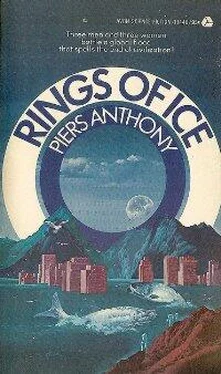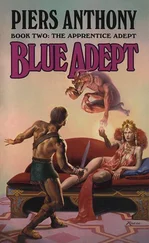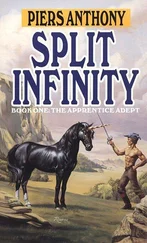Thatch nodded. “The ocean must be two or three hundred feet above its original level by now. That is a lot of pressure on the land. Enough to push it in, make cracks, force the layers to buckle. Earthquakes—”
“Minor compared to what must be going on in the true volcanic regions.” Zena said. “But it certainly makes me nervous here!”
“Nothing we can do but go on,” Karen said. “We’ll have to keep an eye on it for the next few days, however. If steam starts coming up under the bus—”
Zena shivered. “You would think of that!”
They continued on over the nightmare terrain. It took two hours to reach the sea—less time than Zena had expected. Then she realized why: the sea was much closer than it had been.
“It’s not the sea,” Thatch said, realizing what they were thinking. “It’s the Tennessee Valley Lake —the same one we went to before. Much higher and closer now. But before this rain is done, it will be the sea.”
They anchored the near side of the net to trees that had not yet been drowned or washed out, and flung the rest into the water. There was no concern about man-eaters here, but there was an obvious current.
Then the bait; chopped-up fragments of human bone and tendon. They let these sink, and waited half an hour for the fish to discover the delicacies and gather. The theory was that the aromas would spread through the water and alert any hungry lake denizens within range.
At length they hauled it in. There were a few small bony fish that looked unhealthy.
Zena sighed. “I know it’s not much of a day and not much of a net, but somehow I expected better.”
“This is a new lake,” Karen said. “The creatures we saw last time must have been a passing phase, and there hasn’t been time for a new population to develop. The original spawning beds must have been washed out. This rain is as hard on the fish as on us!”
Floy had been idly digging in the soaking ground with a stick. She was making a fair hole, since all it took was energy and she wasn’t aiming for any specific place. “Look!” she said.
It was a fat grub. “Bait,” Karen said.
“I was thinking of food,” Floy said. “Must be a lot of these in the ground. It’s so wet and warm—”
Zena made a face, but Karen took the matter seriously. “You’re right, Floy! Grubs, worms, insects—wherever there is some protected dirt, they must be multiplying explosively. If we could eat them, we would never have to stray far from home.”
“Not so fast!” Zena said. “There is very little protected dirt on this mountain. This is a recent alluvial deposit— material carried down by the water as it slows to enter the lake. You can tell, because there is no moss on it. You won’t find similar deposits near the bus. And the grubs can’t be everywhere; probably this one was carried down with the dirt and only survived by chance.”
Thatch looked at the few small fish they had netted. “I can come down here alone each day and bring back a few.”
“Fish and grubs,” Karen said. “It won’t be much, but maybe enough to tide us through until the ocean arrives.”
“I’d as soon eat the moss,” Zena said. Then she lifted her head, startled at the notion. “The moss—if we could eat that —”
“But the smell!” Floy protested, wrinkling her nose. Her lip pulled up as she did it, reminding Zena that Floy’s coordination problems were not over.
“What about the smell of some kinds of cheese?” Zena asked. “They smell like stale urine. So do some wines— and they look the part, too! We could acquire the taste, if there were enough food value.”
Karen nodded. “You may have a point. Let’s try some.”
“It might be poisonous,” Floy said.
Karen harvested a handful of green from the nearest rock. “Possible, but the odds are against it. This stuff hasn’t been around long enough to have natural enemies, so shouldn’t have defenses against them. And its odor may do that job anyway.” She put the stuff to her mouth. “But if it is deadly, there’s only one way to find out.” She took a bite.
The others watched in apprehensive silence while she chewed. “Uh, awful!” Karen said. But she took another mouthful.
“Maybe it would taste better if you cooked it,” Zena suggested. “Cooking changes onions, rhubarb—”
“Could be,” Karen agreed. “If we got rid of the present flavor, then spiced it up with other things.”
Cooking did help some, and spices some more; but mainly they just had to acquire a taste for the green growth. Karen’s digestion did not suffer, so they deemed it fit for human consumption. Once they had accepted the notion of eating the foul stuff, it was like manna from heaven. Instead of fishing, Thatch went out foraging for superior flavors of moss; there were several varieties. The menu was dull, but it kept them alive when all other food was gone.
The rain continued; two months, three months, four. Wurm had now had time to join Mindel and Riss, prolonging the deluge. The water scoured the exterior of the bus and dug out the ground beneath it. Every day they shoveled material back in to shore it up, and carried the largest rocks they could handle, but it was a losing battle against the indefatigable elements. If the rain did not abate soon, the bus would start its slide down the mountain. Already the palisade was gone, and Gordon’s grave, and all the wood that had not been tied together and anchored to the bus.
Thatch was always punctual—until the day he did not return. “The terrain could have changed,” Karen said. “Maybe the roof of a river caved in, and he has to circle back the long way.”
“Maybe he’s hurt,” Gus said. “Somebody should go after him.”
Not Gus himself, obviously. And not Floy; her coordination would merely get her in trouble, too. And Zena was now six months pregnant.
“I agree,” Karen said. “And I am the one. But there’s something you should know.”
“We know it,” Floy said. “You’re out of insulin.”
Zena was horrified. She had buried the knowledge that Karen’s time was running out, and had almost convinced herself that the crisis would never come. “Oh, no!” she cried. “Is that true?”
“True. I have been rationing it, but there are limits. I have enough for only a few more days. I have been able to function well enough because I have not been eating much. But if I have to go out in that storm, I need to be fully alert—and that means eating a big meal and using all my remaining supply in one dose.”
“No,” Zena said firmly. “You can’t do that.”
“I’m not making excuses,” Karen said. “I have been resigned to my situation for some time. The number of days remaining is less important than the use to which they are put. I had hoped to be on hand to help with the baby; now I know that is not to be. I think I ought to go look for Thatch; you need him for survival. But if I fail—”
Gus had seemed not to understand the nature of the dialogue. Now he came to Karen. “You’ll be all right,” he said reassuringly. “You don’t need that stuff. Maybe a few days withdrawal pains…”
“Maybe so,” Karen agreed with a half-smile.
Zena exchanged glances with Floy. Both knew that the end of the insulin meant the end of Karen. Gus was fooling himself, and Karen was going along, rather than aggravate the situation. It was easier—for everyone—if the truth were suppressed—until the end.
“Come on back,” Gus said.
Karen went with him. Zena was disgusted.
“What is it like?” Floy asked, watching them go. “I can see Karen likes it. Gordon said I was a child, so he never…” Her face clouded up, as it did whenever she remembered Gordon, and she was unable to continue.
Читать дальше










